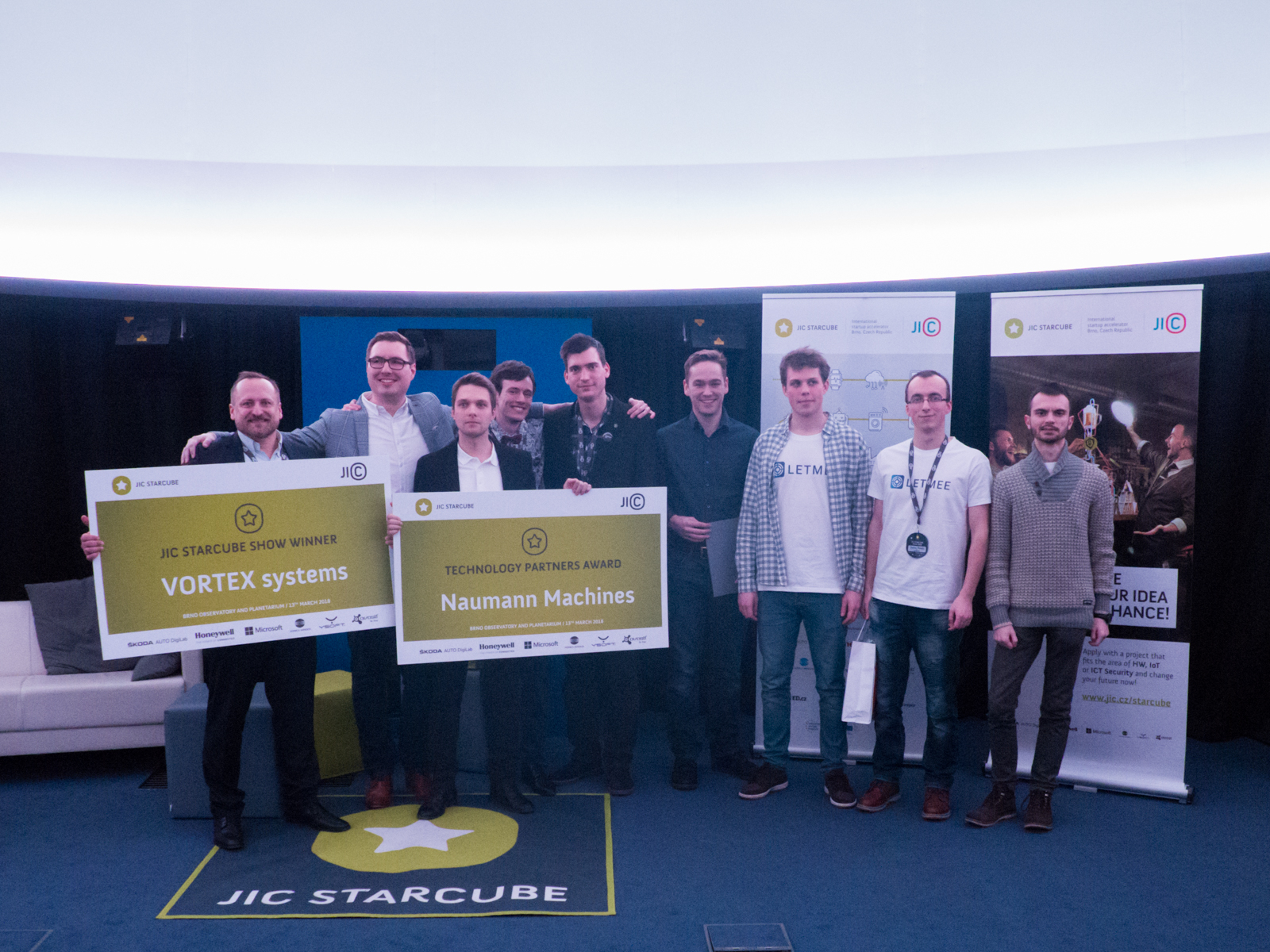VORTEX systems wins JIC STARCUBE Show with innovative machine to pump flood water
An innovative machine for pumping large amounts of sewage water from flooded areas has won the ninth JIC STARCUBE Show. Tonight, at the Brno Observatory and Planetarium, the emerging start-up VORTEX systems won over the professional jury. The audience, on the other hand, preferred a group of four university students who design laser targets for sport and hobby shooting. The media were most impressed by a life-saving bracelet. The technology partners award went to Russian start-up Naumann Machines, designing intelligent vending machines.
“We’re responding to climatic change. Villages and cities are having to deal with flooding more and more often. Volunteer firefighters in particular cannot afford expensive machines to drain away water. That’s why we’ve designed a pump which will be more affordable for them,” says founder of VORTEX systems Tomáš Murajda. The company will also be using 3D printers to reduce production costs. The start-up is now going to work on new versions of the machine with the help of local partners in Brno.
Jari Makkonen, founder of the Finnish company Mistral Consulting and jury member, explained the jury’s choice: “VORTEX systems is trying to solve a real issue and you can see benefits for the final clients. Additionally, they have a unique and patented product, which could be one of a kind on the market.” He chose the winner in conjunction with other prominent professionals from the world of start-ups and business. The jury member representing the Czech Republic was Radek Pav. Two weeks ago, as a partner of the multinational EY, he awarded the title for Starting Entrepreneur of 2017 to Oliver Dlouhý from the fast-developing company Kiwi.com. Oliver had previously been on the JIC Starcube programme in 2012 with his start-up Skypicker.
In comparison with the international jury, who had to be wowed over the course of today’s performance, technology partners were holding regular meetings with representatives of these emerging companies throughout the programme. In terms of business potential, they were most impressed by the Russian project Naumann Machines. Its members would like to stay in Brno and are now sorting out the necessary permits and visas. “After two months of training at the accelerator, we realised that the Czech Republic is a strategic location for us in terms of our business. At the same time, we were amazed by Moravia and we would like to settle here,” said Konstantin Daylidonis, co-founder of Naumann Machines.
Luring companies to Moravia is one of the aims of the JIC STARCUBE programme and in this respect, it tries to help foreign participants. “This year, the actual programme was shortened from three to two months and is now more intensive. We wanted to accommodate those coming from outside the EU, who due to visa restrictions can only stay for a short time,” added Hana Šudáková, Manager of JIC STARCUBE.
This year the technological partners were Honeywell, Škoda Auto DigiLab, Microsoft, Konica Minolta, Avast and Y Soft. Media partners included Hospodářské noviny, IHNED.cz and TyInternety. The programme was also supported by Enterprise Europe Network. More information about the JIC Starcube accelerator and its programme can be found on the website.
Competing teams:
LETMEE (Czech Republic) produces a safe, multifunctional, economical and environment-friendly laser target. Their product is designed for sports training, fans of shooting, or leisure-time activity managers.
The Life-Saving Bracelet (Czech Republic-Slovakia) was developed as a result of a life and death situation experienced one of the founders, who discovered that seconds really do matter when trying to save a life. And so, the company designed a bracelet that can measure temperature, heart rate and monitor breathing. In emergencies it can also send signals and data to rescuers or a doctor.
Naumann Machines (Russia) develops vending machines whose design and construction can contain any sort of goods. Machines include built-in software designed to flexibly respond and offer goods according to the type of the customer.
PublishAR - SyncLab (Serbia) is producing a new platform for ordinary users (i.e. not programmers) which will be able to create content for extended and virtual reality. The start-up is now focusing on cooperation with schools, where such an app can breathe new life into the syllabus. For example, it can make 2D pictures in books move and give them a third dimension.
VORTEX systems (Slovakia) focuses on manufacturing hydrodynamic high displacement pumps. 3D printers are used to help make these machines, which should offer a fast and practical solution in flooded areas after torrential rains or intensive storms.
Contact: Ivana Malá, +420 737 549 742, mala@jic.cz

